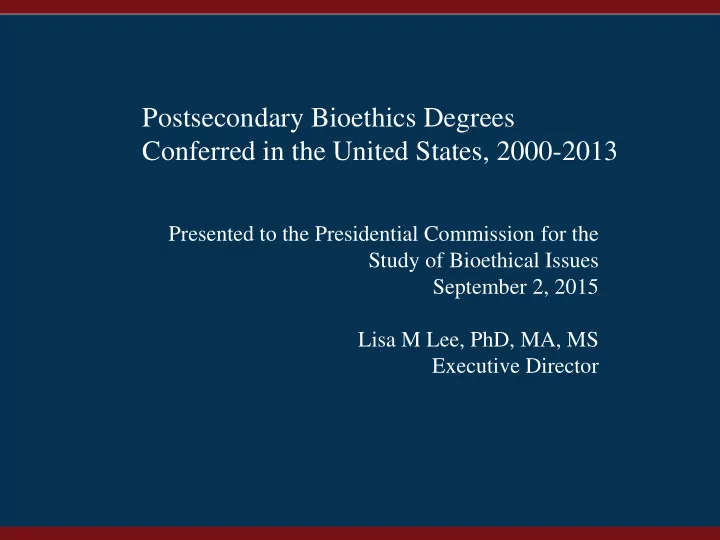

1 Postsecondary Bioethics Degrees Conferred in the United States, 2000-2013 Presented to the Presidential Commission for the Study of Bioethical Issues September 2, 2015 Lisa M Lee, PhD, MA, MS Executive Director
2 Lee LM, McCarty FA. Postsecondary bioethics degrees conferred in the United States, 2000-2013. Hastings Center Report 2015 (in press). The findings and conclusions reported here are those of the authors and do not necessarily represent the official positions of our home institutions.
3 Background • Bioethics has grown rapidly since its ‘birth’ in 1960s • Debate regarding whether bioethics is a discipline, field, or something else • Teaching competency has been a concern from the start
4 Background • The Hastings Center: The Teaching of Bioethics , 1976 – Described scope of bioethics teaching – Handful of small-scale programs within philosophy and religion departments – MA, PhD unnecessary in late 1970s – Left door open for creation of formal degree programs
5 Background • Efforts over past decade to develop methods and theory • Calls for integrated training and dual competence • New programs enrolling bioethics ‘majors’ • Objective: To examine the number and types of US bioethics degrees and programs since 2000
6 Methods • Integrated Postsecondary Education Data System (IPEDS) – National Center for Education Statistics – Requirement for institutions participating in federal financial aid program • Degree coded by Classification of Instructional Programs (CIP) system – Four revisions since 1985, most recent in 2010 – Bioethics (2000) and applied/professional ethics (2010)
7 Results Number of Postsecondary Bioethics Degrees Conferred, United States, 2003-2013 350 Number of Degrees Conferred 300 250 200 150 100 50 0 2003 2004 2005 2006 2007 2008 2009 2010 2011 2012 2013 Year Degree Conferred Bachelor PostBachelor Cert Master PostMaster Cert Doctoral
8 Results Number of Postsecondary Institutions Conferring Bioethics and Applied Ethics Degrees, United States, 2003-2013 30 Number of Instutions Conferring Degrees 25 20 Bachelor Certificate 15 Master Doctoral 10 5 0 2003 2004 2005 2006 2007 2008 2009 2010 2011 2012 2013 Year
9 Limitations • Data likely underestimate both number of degrees and number of programs – Uptake of new codes takes 1-2 years • Does not represent the number of bioethicists – Training of persons who consider themselves bioethicists varies • Unable to assess consistency across programs
10 Findings • Since turn of century, number of degrees and degree programs has grown at both undergraduate and graduate levels • Greatest growth in master’s degrees and certificates – Indicates persons studying bioethics are prepared in other primary disciplines – Augmentation of professional disciplinary credentials
11 Findings Science Medicine Philosophy Technology Law Bioethics
12 Possible Next Steps for the Field • Accreditation standards and consistency across programs – What can one expect to gain from postsecondary training in bioethics? – What does it mean to have a master’s degree in bioethics? • Reflection on what it means to be a ‘bioethicist’
13 Thank you
Recommend
More recommend